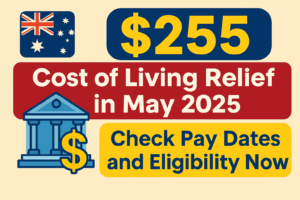LONDON, UK – In a significant move to combat rising living costs, the UK Government has confirmed the continuation of the £500 DWP Support Payment for 2025. The one-time grant, issued under the Household Support Fund (HSF), is aimed at providing relief to vulnerable households facing financial hardship due to inflation, energy bills, and other essential expenses.
This guide breaks down everything you need to know—whether you’re a pensioner, parent, carer, or part of a low-income family—and walks you through eligibility, required documents, the application process, and additional support available.
Overview of the 2025 £500 DWP Payment
| Feature | Details |
|---|---|
| Payment Amount | £500 (one-time grant) |
| Source of Funding | Household Support Fund (DWP) |
| Eligible Groups | Low-income families, pensioners, disabled individuals |
| Application Deadline | 31 March 2025 or until funds are depleted |
| Distribution Method | Through local councils across England, Scotland, Wales |
| Official Website | www.gov.uk |
The support payment is non-taxable and does not count as income. It will not affect any existing benefit entitlements.
What Is the Household Support Fund?
Launched in October 2021, the Household Support Fund was designed to provide local authorities with financial resources to assist residents in meeting essential daily needs such as food, fuel, rent, and clothing.
Due to continued economic strain from inflation and post-pandemic recovery challenges, the fund has been extended through March 2025. Billions have been distributed to councils, who administer the support based on local demand and eligibility.
In 2024 alone, over eight million households received help under this scheme.
Who Is Eligible for the £500 DWP Payment in 2025?
Eligibility is determined by your local council, but most authorities follow a similar framework. The following groups are most likely to qualify:
1. Low-Income Households
These include individuals or families who:
-
Receive Universal Credit, Housing Benefit, Child Tax Credit, Income Support, or Working Tax Credit
-
Are employed but struggling to cover rent, food, utilities, or childcare costs
2. Pensioners
Older adults who:
-
Receive Pension Credit
-
Are on fixed incomes or have minimal savings
-
Face unexpected expenses such as energy arrears or medical costs
3. Disabled Individuals and Carers
This includes those who receive:
-
Personal Independence Payment (PIP)
-
Disability Living Allowance (DLA)
-
Employment and Support Allowance (ESA)
-
Carers supporting someone with disabilities
4. Families with Children
Including families who:
-
Receive free school meals for their children
-
Have high childcare costs or recent income disruption
-
Are receiving child benefits but remain under the poverty threshold
5. Other Vulnerable Groups
May include:
-
People in temporary accommodation or facing homelessness
-
Victims of domestic abuse
-
Recently released individuals from hospitals, prisons, or care facilities
Note: Local authorities may have specific conditions or thresholds. Always check your local council’s website for details.
How to Apply for the £500 DWP Support Payment
Step 1: Locate Your Local Council
Use the UK Government Council Finder to enter your postcode and find your local authority. All applications must be submitted through the relevant local council.
Step 2: Access the Council’s Support Page
Visit the council’s website and search for sections like:
-
Household Support Fund
-
Cost of Living Support
-
Local Welfare Assistance
This page will explain:
-
Local eligibility criteria
-
Payment types (cash, vouchers, prepaid cards)
-
Contact details and submission deadlines
Step 3: Prepare Required Documents
Common documentation includes:
-
Photographic ID (passport or driving licence)
-
Recent bank statements (last two or three months)
-
Proof of benefit entitlement (Universal Credit or ESA letters)
-
Recent utility bills, rent statements, or council tax letters
Step 4: Complete the Application
Depending on the council, application methods may include:
-
Online forms (most preferred)
-
Telephone applications (for those without internet access)
-
Paper-based submissions or in-person drop-ins at council offices or charities
Step 5: Wait for a Decision
Processing times range from 2 to 4 weeks. If successful, households will receive:
-
A £500 bank transfer
-
Supermarket vouchers
-
Prepaid debit cards for essentials
Apply as early as possible, as funds are distributed on a first-come, first-served basis.
Real-Life Example: Emma’s Story
Emma, a 35-year-old single mother from Birmingham, lost her part-time job in late 2024. With rent and energy costs rising, she fell behind on bills. She learned about the Household Support Fund through her council’s website and applied with her Universal Credit letter, a recent bank statement, and utility bill.
Three weeks later, Emma received the £500 support payment via bank transfer. She used the funds to pay down her gas bill and purchase groceries, providing stability for her and her two children during a difficult time.
Additional Support You May Be Eligible For
Beyond the £500 support, other schemes may provide additional help:
Warm Home Discount
-
Offers £150 off winter electricity bills
-
Automatically applied for some pensioners and low-income households
Cold Weather Payment
-
£25 per week during periods when temperatures fall below 0°C for 7 consecutive days
-
Automatically issued to eligible benefit claimants
Energy Supplier Hardship Funds
-
Available from British Gas, EDF, E.ON, and others
-
Can cover energy arrears up to £2,000
-
Application support available through Citizens Advice
Food and Clothing Vouchers
-
Offered by many councils or local charities
-
May include school uniform grants or food parcel referrals
-
Visit sites like Turn2us or contact your local support hub for help
Frequently Asked Questions
Can I receive the £500 more than once?
No, this is a one-time payment per household during the 2025 support cycle.
Will the payment affect my existing benefits?
No, it is a non-taxable, non-income-based grant and will not reduce or affect Universal Credit, Pension Credit, or any other benefits.
What if I do not have internet access?
Contact your local council by phone or visit a local library or community centre. Many Citizens Advice branches also provide help with applications.
Can students apply for this support?
Most full-time students are not eligible unless they have dependents or can prove financial hardship.
When will the money be paid?
If approved, payments or vouchers are typically issued within two to four weeks of application, depending on your local authority’s processing times.
Conclusion: Apply Early, Share Widely
The £500 DWP Support Payment for 2025 is more than a government handout—it’s a practical financial relief tool for households on the edge. If you or someone you know is struggling to afford food, energy, or housing costs, don’t hesitate to explore this option.
Visit your council’s website, prepare your documentation, and apply early. The funding is limited, but for those who act quickly, it can be the bridge between hardship and stability.









